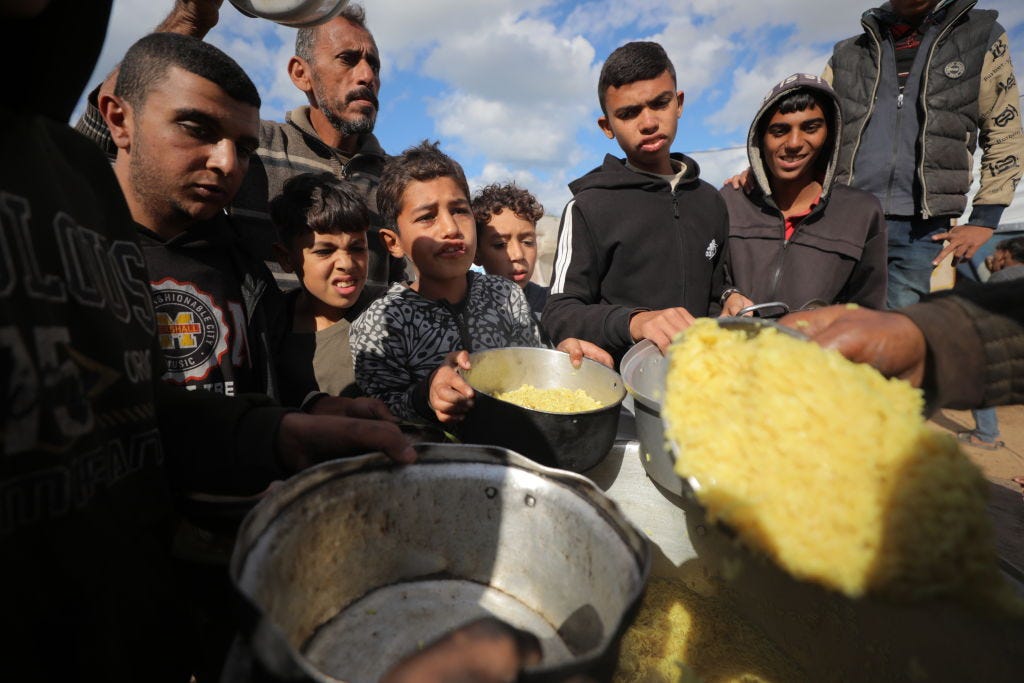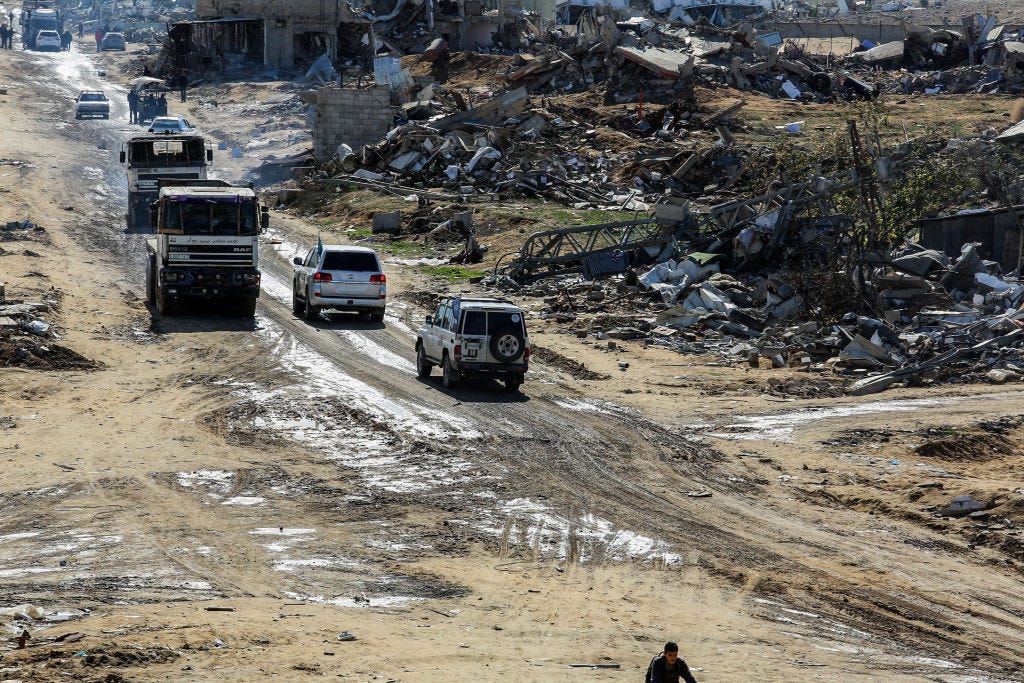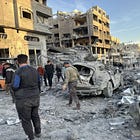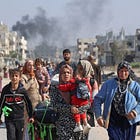'Colossal Failure:' Israel Made Humanitarian Crisis in Gaza Worse, Despite ICJ Ruling a Year Ago
Surge of aid during Gaza ceasefire shows Israel could have always allowed more assistance in, aid groups say.

In the year since the International Court of Justice ordered Israel to take immediate steps to allow more humanitarian aid into Gaza, the situation on the ground has only deteriorated, highlighting Israel’s “colossal failure” in implementing the measures, a group of aid organizations said in a report just released.
At the same time, the surge in aid Gaza has seen since Israel’s fragile ceasefire with Hamas took effect a little more than a week ago underscores how “simple it would have been for the government of Israel to have decided to provide the bare minimum needed for Palestinians to survive at any point,” said Scott Paul, the director of peace and security at Oxfam America, a co-author of Monday’s report.
The report comes a year after the ICJ found a “plausible” risk that Israel was committing genocide in Gaza and issued six provisional measures, including ramping up humanitarian aid, that Israel must take to protect Palestinians in Gaza from additional harm.
But in that year, the humanitarian situation has not only not improved, but it has dramatically worsened, the aid groups warned, leading to an “unprecedented suffering for Palestinians in Gaza.”
Israel ‘Impeded Humanitarian Response’
The findings of Monday’s report are based on a survey of 35 international and Palestinian aid groups that are providing assistance in Gaza, including Oxfam, the Norwegian Refugee Council, CARE, and ActionAid, who were asked about their experiences delivering aid from the day of the ICJ ruling on Jan. 26, 2024, to Jan. 9 of this year, before the ceasefire between Israel and Hamas took effect.
About 89% of those surveyed said Israel’s actions regarding the provision of aid had worsened since the ICJ’s ruling. Some 93% said the humanitarian situation had deteriorated, while all respondents said Israel’s procedures for aid entry were either “ineffective, had systematically impeded the humanitarian response, or were insufficient to meet needs.”
The vast majority of the groups surveyed that imported aid supplies inside Gaza said they regularly encountered delays. Some groups said they experienced delays of more than two months.
The groups also reported Israel denied entry to many essential items like personal protective equipment, mobile kitchens, hygiene kits, and some food because the Israeli government determined the items could be used militarily.
For its part, Israel rejected the ICJ ruling and, over the last year, said it’s committed to allowing humanitarian aid to reach Gaza while accusing Hamas of stealing assistance – an allegation the armed group has denied. COGAT, the Israeli agency that oversees the delivery of humanitarian aid to Gaza, did not immediately respond to Zeteo’s request for comment.
While the number of aid trucks Israel allowed into Gaza increased slightly in the first three months after the ICJ ruling, it still paled in comparison to the number of trucks entering Gaza before Oct. 7, per data from the UN aid agency (OCHA). An average of 165 trucks carrying humanitarian aid entered the enclave daily in April 2024, compared to 500 trucks entering every day before the war began. The daily average dropped to 72 trucks last December. Even when trucks were allowed to enter Gaza, aid workers faced enormous challenges in distribution to those most in need, including in the northern part of the enclave, where the UN warned last year that famine was imminent.
The lack of aid had a detrimental impact on the humanitarian situation in Gaza: About 90% of Gaza’s 2.1 million people have been displaced; more than 1.8 million people are experiencing high levels of acute food insecurity; more than 60,000 children are expected to need treatment for acute malnutrition this year; and an estimated 150,000 pregnant women and new mothers are in need of health services, according to UN agencies.
Monday’s report also highlights the challenging conditions aid workers have contended with over the last 16 months. About 94% of those surveyed said they had been displaced at least once. Many of the aid groups examined said they had to forcibly relocate operations or temporarily stop them due to Israeli displacement orders or military operations. More than 320 humanitarian workers have been killed since the war began.
Failure of US, Other Nations
Monday’s report underscores not only Israel’s failure to implement the ICJ provisional measures but also the failure of other countries to hold the Israeli government accountable and pressure it to allow more aid into Gaza, the groups said.
Oxfam America’s Scott Paul specifically called out the US government for repeatedly saying Israel wasn’t arbitrarily blocking humanitarian aid, despite the reality on the ground.
“It actually undercut a lot of the work that so many of us, so many of our organizations and other governments had done … to demonstrate what was blocking humanitarian assistance – and [that] the government of Israel was in the unique position to allow all of this aid to move in,” Paul told Zeteo.
The Biden administration, for example, did not punish Israel in November for what aid organizations said was a failure to meet a 30-day deadline imposed by the US to ramp up aid. The US said it concluded Israel had taken steps to increase aid, including by opening a new crossing. But the number of aid trucks allowed into Gaza at the time was at some of its lowest levels late last year.
What’s Next
Monday’s report comes a week after the ceasefire agreement between Israel and Hamas took effect. The amount of aid entering Gaza has surged – in the first six days of the ceasefire, 4,200 aid trucks entered the enclave, according to COGAT. The ceasefire agreement calls for Israel to allow 600 trucks, including 50 carrying fuel, to enter Gaza daily during the first phase of the deal, which is expected to last 42 days.
But the ceasefire remains fragile, and the report highlighted the challenges ahead, as well as the need for accountability.
“It is essential that humanitarian access is not only immediate but sustained and unimpeded. The rights of Palestinians in Gaza must be protected from acts of genocide, and Israel must be held to account for its continued violations of international law,” Riham Jafari, communication and advocacy coordinator at ActionAid, Occupied Palestinian Territories, said in a press release.
Separately, there is growing concern worldwide over Israel’s impending ban on the UN Palestinian refugee agency, UNRWA, the primary agency providing aid in Gaza. The ban is set to take effect this week and will likely have detrimental effects on Gaza.
Check out more from Zeteo:









Ceasefire or no ceasefire; scam or no, we cannot allow Israel to escape the legal consequences of their war crimes. The Hind Rajab Foundation has, among other things, filed a case with the ICC against 1,000 Israeli soldiers for war crimes in Gaza.
https://www.hindrajabfoundation.org/perpetrators/hind-rajab-foundation-files-historic-icc-complaint-against-1000-israeli-soldiers-for-war-crimes-in-gaza
They have taken further steps in recent days, and vacations are becoming a lot more difficult for IDF soldiers, worldwide. The Hind Rajab Foundation can use our help. Please join me in making a contribution.
https://buy.stripe.com/cN228hbY5g7jaM84gg
Great reporting. I'm happy to say goodbye Washington Post, hello Team Zeteo.